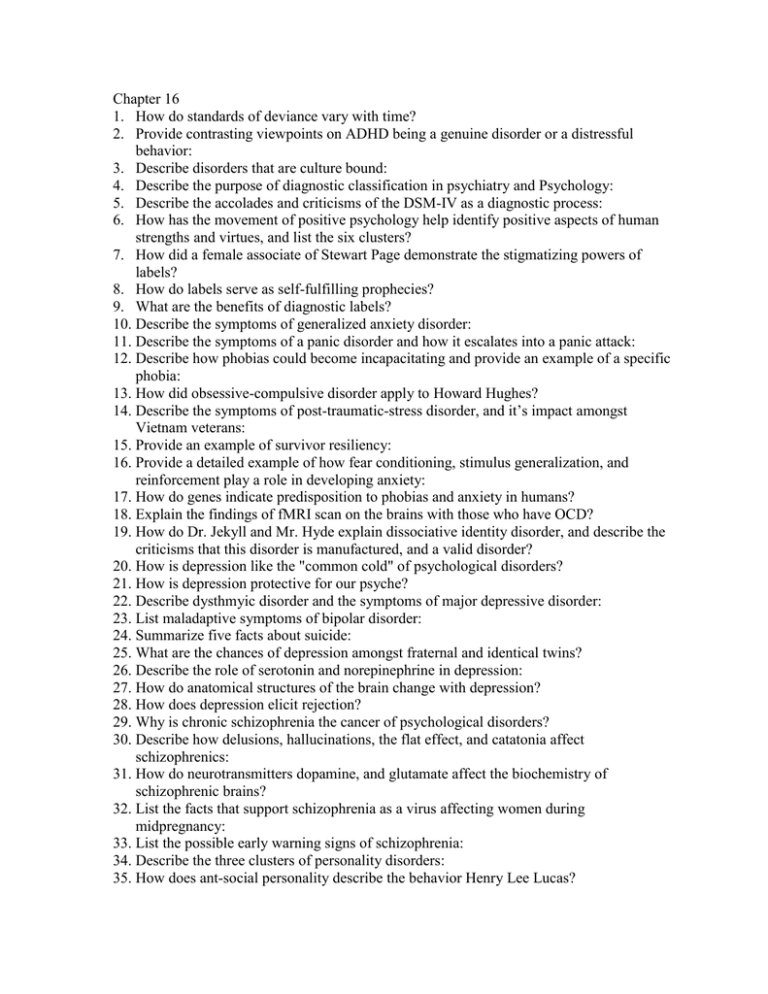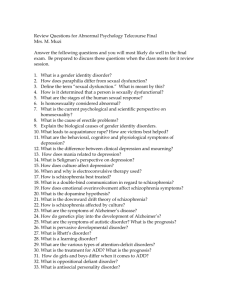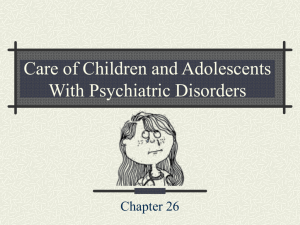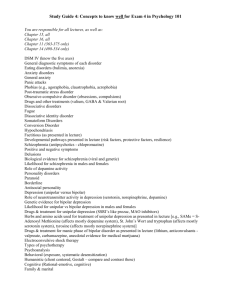Chapter 16 How do standards of deviance vary with time? Provide
advertisement

Chapter 16 1. How do standards of deviance vary with time? 2. Provide contrasting viewpoints on ADHD being a genuine disorder or a distressful behavior: 3. Describe disorders that are culture bound: 4. Describe the purpose of diagnostic classification in psychiatry and Psychology: 5. Describe the accolades and criticisms of the DSM-IV as a diagnostic process: 6. How has the movement of positive psychology help identify positive aspects of human strengths and virtues, and list the six clusters? 7. How did a female associate of Stewart Page demonstrate the stigmatizing powers of labels? 8. How do labels serve as self-fulfilling prophecies? 9. What are the benefits of diagnostic labels? 10. Describe the symptoms of generalized anxiety disorder: 11. Describe the symptoms of a panic disorder and how it escalates into a panic attack: 12. Describe how phobias could become incapacitating and provide an example of a specific phobia: 13. How did obsessive-compulsive disorder apply to Howard Hughes? 14. Describe the symptoms of post-traumatic-stress disorder, and it’s impact amongst Vietnam veterans: 15. Provide an example of survivor resiliency: 16. Provide a detailed example of how fear conditioning, stimulus generalization, and reinforcement play a role in developing anxiety: 17. How do genes indicate predisposition to phobias and anxiety in humans? 18. Explain the findings of fMRI scan on the brains with those who have OCD? 19. How do Dr. Jekyll and Mr. Hyde explain dissociative identity disorder, and describe the criticisms that this disorder is manufactured, and a valid disorder? 20. How is depression like the "common cold" of psychological disorders? 21. How is depression protective for our psyche? 22. Describe dysthmyic disorder and the symptoms of major depressive disorder: 23. List maladaptive symptoms of bipolar disorder: 24. Summarize five facts about suicide: 25. What are the chances of depression amongst fraternal and identical twins? 26. Describe the role of serotonin and norepinephrine in depression: 27. How do anatomical structures of the brain change with depression? 28. How does depression elicit rejection? 29. Why is chronic schizophrenia the cancer of psychological disorders? 30. Describe how delusions, hallucinations, the flat effect, and catatonia affect schizophrenics: 31. How do neurotransmitters dopamine, and glutamate affect the biochemistry of schizophrenic brains? 32. List the facts that support schizophrenia as a virus affecting women during midpregnancy: 33. List the possible early warning signs of schizophrenia: 34. Describe the three clusters of personality disorders: 35. How does ant-social personality describe the behavior Henry Lee Lucas? 36. Describe the studies done by Adrian Raine, and how the results reinforce the biopsychosocial perspective? 37. Do you have a family member or friend who has experienced a psychological order? If so, has anything you have read in this chapter increased your understanding of the challenges that person has been facing?





